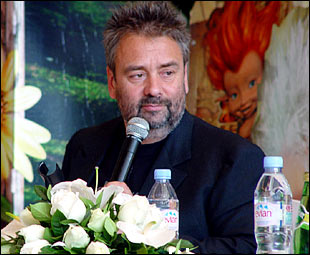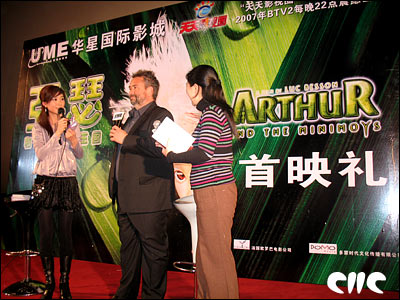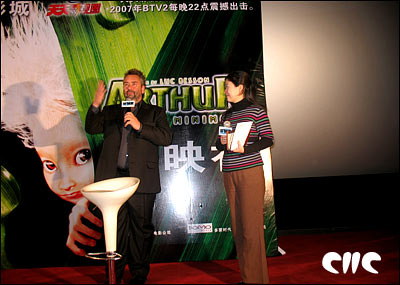| Home / Entertainment / News | Tools: Save | Print | E-mail | Most Read |
| Besson's Minimoys Lands in Beijing |
| Adjust font size: |
The relationship between French and Chinese cinema has traditionally seen French audiences responding very warmly to Chinese movies. Wong-Kar Wai's In The Mood For Love and 2046 made lasting impressions both at the box office and in people's minds. Similarly, Stephen Chow's Shaolin Soccer made younger generations of French film-going audiences reminisce back to their childhood when Japanese soccer anime, Captain Tsubasa, was all the rage.
On a four-day tour across China to present his new movie Arthur and the Minimoys to mainland audiences, Luc Besson, director of Leon and The Fifth Element, met his fans yesterday after his movie's first public showing in Beijing. The film absorbed over four years of Besson's life and cost an estimated 65 million Euros to make, the highest in French film-making history. At a press conference in Beijing on Tuesday, Luc Besson said, "There are too many bad things shown on TV nowadays: like theft, pollution and racial discrimination. As a grown-up, I feel ashamed about what we often let our kids watch. I want to say sorry to them through this movie." The Arthur, mixing animation with real actors, tells of young Arthur, a 10-year old boy living with his grandmother in a country home. His parents being much away most of the time and with his grandfather having recently disappeared, Arthur buries himself in fantastical tales, including one about the Minimoys, minuscule beings with an empire based in his grandparents' garden. It is not long before adventure calls for Arthur, moved by his grandmother being threatened with eviction, should she not be able to pay off the venal property developer who has bought the house from the bank. The first part of the tale bears no great originality as compared to other similar fables but Arthur's vitality, portrayed by a wonderfully vibrant Freddie Highmore, holds the interest. The grandmother's troubled and weepy soul remains unfortunately under-developed while Arthur's caricatured parents seem to leap out of the mind of Roald Dahl. His journey into the Minimoys' world and his transformation into one of their own smacks of a modern Wizard of Oz in the film's leap from real action to animation and of Alice in Wonderland. The Minimoys themselves quickly appear very much as can be guessed from their appearance. Cute, lovable and kind, they are also hardy and living under the constant threat of Maltazard and his mosquito-riding horde. The Minimoys' princess Selenia, both brave and beautiful (there's a shock), her younger brother and Arthur soon volunteer to stop Maltazard's plan to conquer the Minimoys' kingdom by flooding it. Setting off into the wild, the trio face a number of obstacles and it is in their progress and the relationships they develop that the film's true charm emerges. Since Pixar dynamited the animation film industry, it seems to have become compulsory for every animated movie to appeal both to children and adults. While Besson proves deft at handling a younger audience by bombarding them with well-chosen themes, and a good mix of humor and action, it is in his attempt to reach out to the parents that the film becomes clunky. Its frequent and evident references to Star Wars, Saturday Night Fever and Sword in the Stone are not discreet pastiches, available only to the keenest eye, but used to bludgeon viewers into letting off a forced smile. Besson revealed that he had never worked on an animated film before but it is regrettable that for a film that took over four years and 1.7 million hours of labor to complete, more attention was not paid to the pacing. For a children's movie, even one laden with serious themes, Arthur and the Minimoys alienates its audience through choppy editing with gratuitous and unnecessary scenes haphazardly thrown together. It was John Lasseter, Pixar's grand master, who once said that due to the cost-prohibitive nature of an animated movie, the story needed to be injected with something special that would truly capture the interest of the audience without only relying on animated technical prowess. In this, Arthur and the Minimoys meets with mixed success. Its story, although by no means an original one, bears enough freshness and life that it does not get boring. The characters, although stereotypical, often have an additional and surprising dimension and the rapid plot contains a few surprises. In one action scene, Selenia, the doughty warrior princess who quickly becomes Arthur's love interest, is at one point disrobed in a scene breathtaking for its risqué audacity. Chinese parents may be concerned about the relationship between Selenia and Arthur -- which will be viewed as forbidden puppy love by traditional Chinese parents, if their children are close to Arthur's. Ultimately, Arthur and the Minimoys, though possessing all the right elements for a good family film, fails in its composition. It relies too heavily on the presence of the animation for inspiration, something which Pixar and Dreamworks proved to be no longer enough. It may have been Besson's to include references to other tales to provide a point of identification for audiences but misjudges their use and allows them to dominate over the film's rare innovations. Speaking of his film's appeal to Chinese audiences, Besson said: "It's a film for children which carries a message of love. I hope Chinese parents will show this film to their kids, because it will do them a lot of good." The film will officially hit Chinese screens nationwide on January 19, 2007. But Besson confessed on Tuesday that he didn't care too much about Chinese box office revenue. "It is my first movie openly shown in China. I'm happy and proud that my movie has become one of the only 20 movies China imports every year." He said he would have loved to enter the Chinese movie market many years ago, but he regretted that a Chinese movie policy limiting foreign movie imports kept him out for a long time. He said he understood it since the Chinese government is trying to protect the country’s home-made movies. Responding to media reports that Arthur is just another Hollywood product and many bad reviews, Luc Besson disagrees. He pointed out that Arthur had topped box office takings in many European countries, receiving "positive" reviews from film critics, but revealed it has failed in the United States, although American pop star Madonna lends her voice. "Hollywood believes in American values, but this movie appreciates the general value of human beings, that is, to learn to share, to respect people and nature. Arthur is pure French, its whole soul belongs to Europe." He revealed he will probably do sequels due to the box office success in Europe. The director expressed his affection for Chinese movies, such as Lu Chuan's Tibetan antelope movie Ke Ke Xi Li Mountain Patrol when he gave a lecture at the Beijing Film Academy on Monday. One week earlier, Luc Besson had purchased the French distribution rights to last year's Chinese box office hit comedy Crazy Stone. However, during the presentation at Beijing's UME movie theatre yesterday, Besson's audiences bitterly let him down. As the credits rolled, Besson was introduced to an applauding full house. Jovial and funny, Besson seemed to earnestly relish engaging in a debate with his Chinese fans. Unfortunately, a negative impression of the members of the public attending the premiere was difficult to quell when instead of the interesting questions he awaited, Besson was subjected to a barrage of pointless and often insulting comments. One lady argued with the French director about exactly how many times he had visited the Chinese mainland while another man arrogantly inquired as to why Besson had not seen fit to hire major Chinese stars to provide the voices for the Mandarin dub. The puzzled Besson tried to maneuver his way past these oddities before asking to judge a quiz on the movie and being gently shuffled off stage by the Chinese host, clearly feeling her moment in the spotlight becoming an embarrassment.
(China.org.cn by Chris Dalby and Zhang Rui, January 18, 2007)
|
| Tools: Save | Print | E-mail | Most Read |
 |
| Related Stories |


